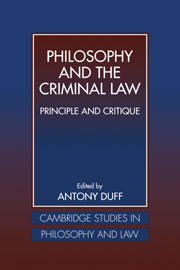Book contents
- Frontmatter
- Contents
- List of Contributors
- Introduction
- 1 Contingency, Coherence, and Conceptualism: Reflections on the Encounter between ‘Critique’ and ‘the Philosophy of the Criminal Law’
- 2 Does Criminal Liability Require an Act?
- 3 ‘Simulacra of Morality’? Beyond the Ideal/Actual Antinomies of Criminal Justice
- 4 Principle and Contradiction in the Criminal Law: Motives and Criminal Liability
- 5 On the General Part of the Criminal Law
- Index
1 - Contingency, Coherence, and Conceptualism: Reflections on the Encounter between ‘Critique’ and ‘the Philosophy of the Criminal Law’
Published online by Cambridge University Press: 17 September 2009
- Frontmatter
- Contents
- List of Contributors
- Introduction
- 1 Contingency, Coherence, and Conceptualism: Reflections on the Encounter between ‘Critique’ and ‘the Philosophy of the Criminal Law’
- 2 Does Criminal Liability Require an Act?
- 3 ‘Simulacra of Morality’? Beyond the Ideal/Actual Antinomies of Criminal Justice
- 4 Principle and Contradiction in the Criminal Law: Motives and Criminal Liability
- 5 On the General Part of the Criminal Law
- Index
Summary
Aristotle himself has said, speaking of the laws of his own country, that jurisprudence or the knowledge of those laws is the principal and most perfect branch of ethics.
William Blackstone, Commentaries on the Laws of England (1765–9), Volume 1, p. 27Human life and philosophical explanations of it move in different planes till the explanation has become so complete as not to interfere with the thing to be explained. When they coincide, they cannot affect each other.
James Fitzjames Stephen, A History of the Criminal Law of England (1883), Volume II, p. 84[T]he degree of systematization of a discipline is the prime index of the state of knowledge of its subject matter.
Jerome Hall, General Principles of Criminal Law (1960), p. 12Each of these contrasting reflections expresses a different view of legal theory. In this chapter, I consider the relationship between two particular approaches to criminal law theory: ‘critique’ and ‘the philosophy of criminal law.’ Whilst the title of my chapter presupposes an opposition between the two, it is in fact one of my main purposes to question that opposition. It is, of course, an opposition which bears some real relationship with the positions held by protagonists in the debate canvassed by Antony Duff in his introduction to this collection. In recent years, a number of British and American writers working within a ‘critical’ tradition have questioned the basis of ‘philosophical’ theories of criminal law which emphasise and seek to elaborate upon its ‘principled’ nature.
- Type
- Chapter
- Information
- Philosophy and the Criminal LawPrinciple and Critique, pp. 9 - 59Publisher: Cambridge University PressPrint publication year: 1998
- 2
- Cited by



